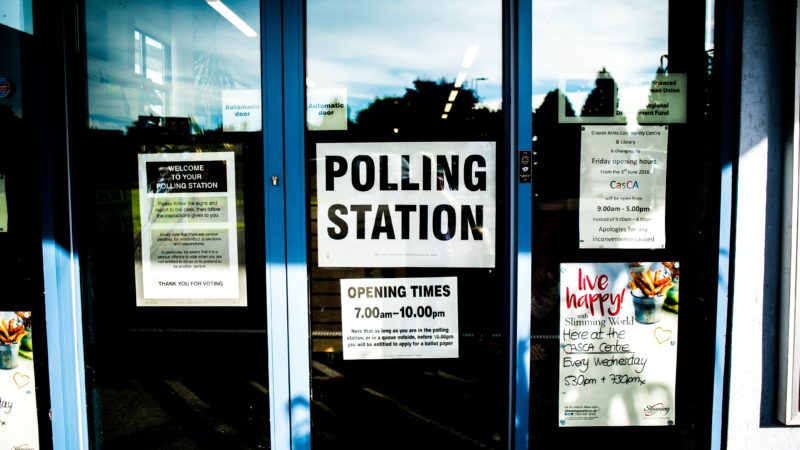
17 leading civil society groups have urged ministers to drop plans outlined in the Queen’s Speech to introduce a mandatory requirement for voters to produce ID amid concerns that the policy would disenfranchise millions of people.
In a statement issued today, signed by organisations including Stonewall, Liberty, the Electoral Reform Society, Operation Black Vote, NUS and Silver Voices, the groups warned that 3.5 million people do not have access to photo ID.
They described the proposed plan to introduce an ‘elections integrity bill’, announced by the government earlier this week, as a “dangerous distraction” that would “bring up the drawbridge to millions of ordinary voters”.
The civil society groups argued the move showed “warped priorities” from ministers. They highlighted the cost of the policy as estimated by the government in 2018, which put the figure at around £20m per election.
“Ministers should heed the warnings of these respected civil rights groups, who know first-hand the undemocratic and discriminatory impact of these Voter ID plans,” shadow minister for democracy Cat Smith said.
“Voter ID is a total waste of taxpayers’ money. The policy is set to cost millions of pounds at every election. Voting is safe and secure in Britain. Ministers should be promoting confidence in our elections instead of spreading baseless scare stories which threaten our democracy.”
Keir Starmer criticised the proposed legislation in his response to the Queen’s Speech on Tuesday, telling Boris Johnson that the bill would make it harder for people to vote, “tramples on civil liberties” and “discriminates”.
“The Prime Minister must know that by introducing compulsory voter ID he will suppress turnout. It will disproportionately impact ethnic minorities and it will weaken our democracy,” he said. “Labour will have no part in that.”
The Queen’s Speech was delivered by the monarch on Tuesday. The address is written by ministers and outlines the laws the government is intending to put through parliament over the course of the next session, which usually lasts one year.
Research suggests that marginalised groups are less likely to have ID, including women, those living in urban areas, the under 20s and over 65s. Driving licence ownership has fallen by 40% among the under 20s since the 1990s.
A Department for Transport survey in 2019 found that 52% of Black people had a driving licence, compared with 76% of the white population. FCA research in 2019 estimated that 1.3 million people in the UK did not have a bank account.
“When millions of people lack photo ID, these proposals would make it harder to vote. They risk disenfranchising a huge swathe of the public,” Electoral Reform Society policy and research director Dr Jess Garland said.
She added: “Instead of spending millions of pounds each election to lock down our polling stations, we should be closing the democratic divide and boosting political engagement. This coalition has one clear message to ministers: rethink this warped priority and scrap this dangerous ID policy.”
Below is the full text of the statement issued today.
Joint statement: Mandatory voter ID is a dangerous distraction
We are writing to express our deep concern about government plans to force voters to show ID at the polling station – or be denied a vote. According to official figures, 3.5 million citizens do not have access to photo ID and 11 million do not have a passport or driving licence. As the government has often made clear, voting is safe and secure in the UK – making mandatory voter ID a solution in search of a problem.
Instead, these proposals will turn polling workers into de facto bouncers – a role they do not want to have, and which raises its own risks of discretion and discrimination. Our democracy is already deeply unequal, with millions missing from the electoral roll, and with major gaps in turnout between groups. We need to be revitalising our democracy – not taking a sledgehammer to political engagement.
Rather than inventing bogeymen and scare stories, ministers should focus on the real priorities facing our democracy. At a cost of up to £20m per election, this is a worrying case of warped priorities. We urge ministers to engage with civil society groups on how to improve our political process, not undermine it. Mandatory voter ID will bring up the drawbridge to millions of ordinary voters. There is still time to think again.
Dr Jess Garland, director of policy and research, Electoral Reform Society
Dennis Reed, director, Silver Voices
Nancy Kelley, CEO, Stonewall
Lord Simon Woolley, founder and director, Operation Black Vote
Kyle Taylor, founder and director, Fair Vote UK
Ibtisam Ahmed, policy and research manager, LGBT Foundation
Professor Matt Henn, chair of social research, Nottingham Trent University
Sam Grant, head of policy and campaigns, Liberty
Cara English, head of public engagement, Gendered Intelligence
Patricia Stapleton, policy manager, Traveller Movement
Isobel Ingham-Barrow, head of policy, MEND
Tim Hughes, director, Involve
Nick Lowles, CEO, HOPE not hate
Larissa Kennedy, president, National Union of Students (NUS)
Mete Coban MBE, chief executive, My Life My Say
Jo Hobbs, CEO, British Youth Council
Dorian Leatham, CEO, Migrants’ Rights Network




More from LabourList
‘I was wrong on the doorstep in Gorton and Denton. I, and all of us, need to listen properly’
‘Why solidarity with Ukraine still matters’
‘Ukraine is Europe’s frontier – and Labour must stay resolute in its defence’